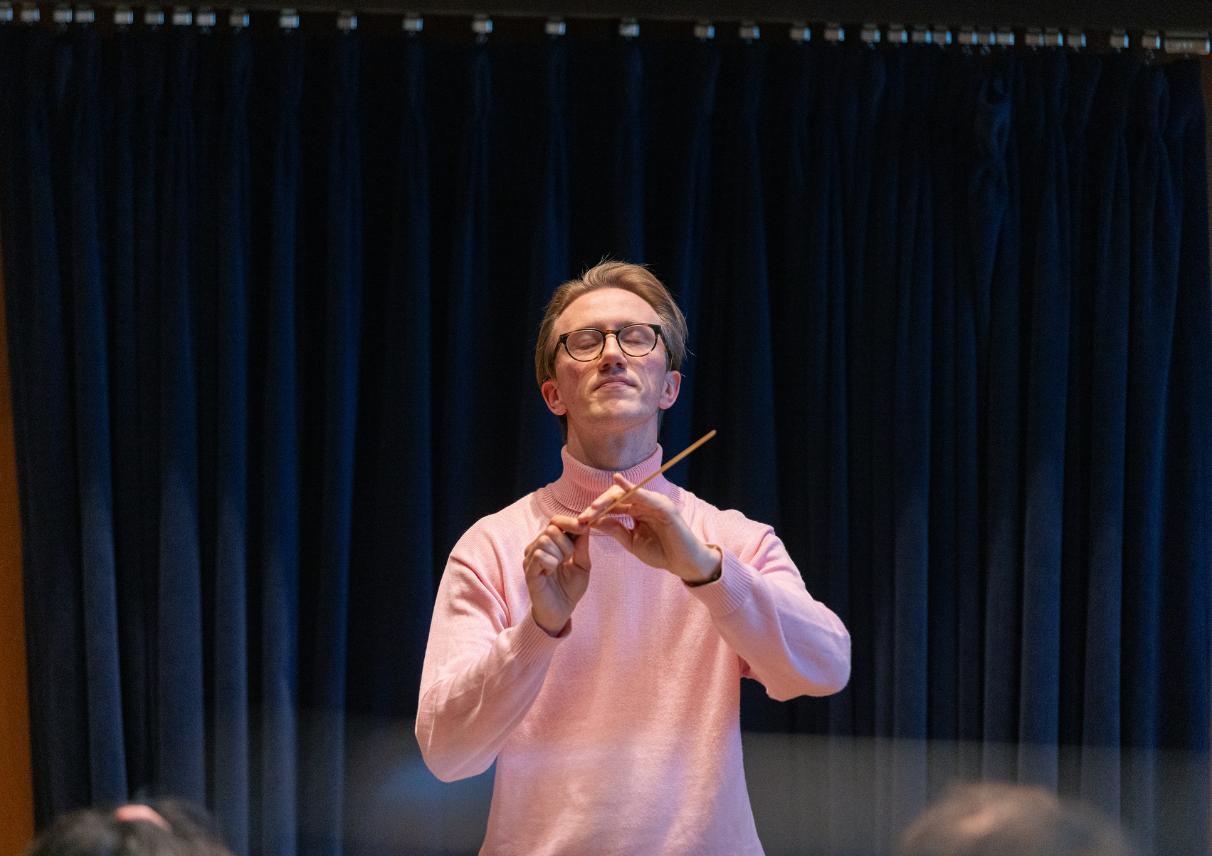Discipline in an age of distraction (part 2)
In the first installment in this series we acknowledged the smartphone as a convenient tool and explored the danger our devices pose in terms of distraction. Each of us has a unique relationship with our phone and a different approach to our use thereof. We left off with this: “A clear and objective picture of what smartphones deliver and how connectivity affects our lives is something everyone would be well served to understand.” In this, the second installment in the series, we spend a little bit more time on distraction and even more on different strategies members of the School of Music community employ to avoid it.
Orchestral conductor Sam Hollister ’18BA ’28DMA says he faced heightened distraction during the pandemic, when, because he wasn’t in school and because the music world was shut down, he had less structure to rely on and more time in which to get lost in cyberspace. “I didn’t have an external obligation to study the way I wanted to before grad school,” Hollister says. While giving in to distraction was something of a universal reflex during those months and years, it wasn’t a welcome escape for Hollister. “I didn’t like that it didn’t matter,” he says. Like most of us, Hollister uses technology in his work and daily life.
So, too, does choral conductor Margaret Winchell ’28DMA, who relies on devices for “lots of task management” and other uses. Winchell recognizes “our propensity to do things in little, bitty chunks” because our attention spans are limited. There are “so many inputs,” she says, explaining that technology has made us accustomed to constant stimulation. “I feel the struggle of it,” she says. That struggle is something that faculty experience, also.
Assistant Professor of Composition Katherine Balch, a YSM alum (’16MM), says, “I’m not really active on social media at all, but I check social media all the time, and I don’t know why. It’s not something that brings me joy. … It’s this weird thing I’m addicted to.” But distraction can come from places that don’t just serve up other people’s posts, including the online marketplace and elsewhere. “I obsessively check my email,” Balch says, “and I wish I didn’t.”
Professor in the Practice of Violin Augustin Hadelich, who, like many musicians, uses a metronome app on his phone, has quite a bit to say about social media and distraction. “I find looking at a social media feed during my practice breaks to be problematic,” Hadelich says. “It takes you out of the character of the piece you are working on. … There is also the psychological burden of looking at an Instagram feed. It’s impossible not to feel a certain fear-of-missing-out when I look at the cool things other musicians are doing right now. My reaction to the Instagram feed has nothing to do with how busy or successful I am that day or how much I'm enjoying my current project!”
Disarming distraction
For those who battle distraction, mitigation strategies can be helpful. Hollister found solace in the obligations that come with studying orchestral conducting at the School of Music. Distraction gave way to compartmentalization, which was necessary in the face of “having external pressure.” He no longer lets himself get hijacked by distractions. Instead, he sets them aside. “I budget time to do things that are not productive,” he says. “Being in control of those breaks is huge for me.”
For Winchell, that control comes with time away from screens. This past summer, in the spirit of strategy, Winchell wrote the text of a choral piece on a legal pad. “I could just look at the text and hear the music,” she said. Capturing information in that way can help one commit it to memory. And there is tactility, which the digital realm doesn’t offer. That’s something Winchell counts on when recharging, too. She cooks, and bakes. That time in her kitchen serves as a break from work. “It’s tactile,” she says, “and for me that’s grounding and restful. I give myself permission to spend time—that I may not have—making food. The act of making it rewards me with energy.”
Balch feels rejuvenated when she takes a break from addictive content. She recently uninstalled Facebook from her phone, but kept the Instagram app. And she uses SelfControl, which was designed, its creators say, “to help you avoid distracting websites.” That avoidance, for Balch, has its rewards. “I notice if I don’t go on social media in particular that I’m happier and I have more energy and focus.”
Hadelich says he adjusted his social-media settings “to avoid the most negative effects of the social media feed—I carefully curated my Facebook feed to only show me posts of cartoons, funny memes, sci-fi-related nerdy stuff and other things that have nothing to do with music.”
Conversations and concerns
Hadelich has discussed with his students the anxiety that social media can generate. “When I talked about this to my students, several felt this way too and are limiting their use of social media,” he said. “They were surprised it happened to me as well!”
Balch says her students ask “career-anxiety questions” and bring up related concerns. “Part of me does wonder if it comes from this type of comparison we engage in in social media,” Balch says, adding, “I have that anxiety, too.”
This is the second installment in a series that will explore discipline in an age of distraction. The Communications Office welcomes the participation of students and faculty alike. Anyone interested in sharing their experiences is invited to send email to david.brensilver@yale.edu.






